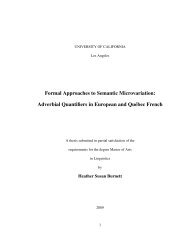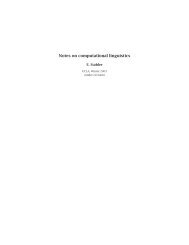Post Verbal Subjects and Agreement in Brazilian Portuguese
Post Verbal Subjects and Agreement in Brazilian Portuguese
Post Verbal Subjects and Agreement in Brazilian Portuguese
You also want an ePaper? Increase the reach of your titles
YUMPU automatically turns print PDFs into web optimized ePapers that Google loves.
(70) a. [ SC [as men<strong>in</strong>as] pro-there pl]]<br />
b. [ vP [as men<strong>in</strong>as] i arrive j [ VP t j [ SC t i pro-there]]<br />
c. [ TP [pro-there] k arrive j [ vP t k [as men<strong>in</strong>as] i t j [ VP t j [ SC t i t k]]<br />
Alternatively, the predicate may stay low <strong>in</strong> the structure, with the subject<br />
rais<strong>in</strong>g to spec-TP, yield<strong>in</strong>g SV order<strong>in</strong>g (I assume that the silent expletive does not<br />
require case):<br />
(71) a. [ SC [as men<strong>in</strong>as] pro-there pl]]<br />
b. [ vP [as men<strong>in</strong>as] i arrive j [ VP t j [ SC t i [pro-there]]<br />
c. [ TP [as men<strong>in</strong>as] k arrive j [ vP t k [ VP t j [ SC t k [pro-there]]]<br />
Note that there is an apparent difference <strong>in</strong> the behavior of unaccusatives<br />
versus existentials regard<strong>in</strong>g this second possibility (subject rais<strong>in</strong>g) <strong>in</strong> BP. In the<br />
case of English, the derivations given <strong>in</strong> (70) <strong>and</strong> (71) represent both existentials<br />
<strong>and</strong> unaccusatives. This is consistent with Stowell’s (1981, 1983) analysis, where<br />
rais<strong>in</strong>g of the expletive gives rise to existential sentences (72), whereas rais<strong>in</strong>g the<br />
subject of SC gives rise to copular constructions with a locative predicate (73). 19<br />
(72) There is a cat on the mat.<br />
(73) A cat is on the mat.<br />
In the case of BP, the existence of this alternation is not as transparent:<br />
(74) T<strong>in</strong>ha/ t<strong>in</strong>ha-m duas men<strong>in</strong>as na festa.<br />
had.sg/had-pl two girls at-the party<br />
‘There were two girls at the party.’<br />
19 Moro (1993, 1997) <strong>and</strong> Zamparelli (1995) adopt Stowell’s analysis <strong>and</strong> suggest mechanisms to<br />
derive the different <strong>in</strong>terpretation of the expletive (<strong>in</strong>terpreted as a location only <strong>in</strong> the copular case).<br />
24

















